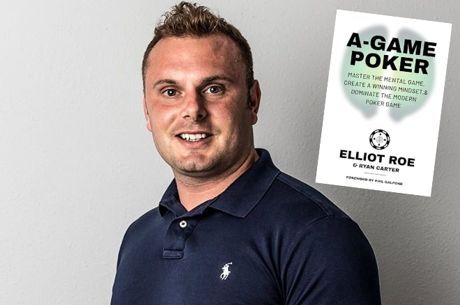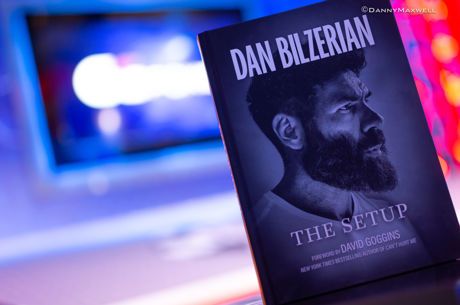PokerNews Book Review: Final Table by Jonathan Duhamel

Since the end of May, the 2012 World Series of Poker has been unfolding at the Rio All-Suite Hotel & Casino in Las Vegas. Poker amateurs and professionals have packed the convention center to test their skills in one of 61 bracelet events, and spectators have packed in, too, to catch glimpses of their favorite players on poker’s biggest stage. Needless to say, it was the perfect opportunity for the 2010 WSOP Main Event champion, Jonathan Duhamel, to offer an exclusive release of his new book, Final Table: A Winning Poker Approach from a WSOP Champion.
Before receiving an advanced reading copy of Final Table as PokerNews’ resident book reviewer, I wasn’t even aware Duhamel was writing a book, though it made sense because plenty of former Main Event champions have done so in recent years. Books include Chris Moneymaker’s Moneymaker: How an Amateur Poker Player Turned $40 into $2.5 Million at the World Series of Poker, Joe Hachem’s Pass the Sugar, and Scotty Nguyen’s That’s Poker Baby! Vol. I.
I was hoping Final Table would follow those works and serve more as a memoir than a poker strategy text but wasn’t quite sure what to expect. With that said, I was hopeful the description on the book’s back cover would enlighten me:
In Jonathan Duhamel’s Final Table, discover what it takes to win $8.9 million in one tournament. Duhamel takes readers through crucial game moments and traces his strategic thinking. Should he go all in? Should he fold? What is the right balance between risk and caution? Duhamel reveals the specific qualities winning poker players need.
Learn about Jonathan’s development as a poker player from his earliest days through to his online playing, into tournament and the decision to go pro. Whether you’re a Friday night player or a professional, Final Table will entertain and educate you.
Interestingly, the dichotomy for me concerned the last sentence of that description: “Final Table will entertain and educate you.” You see, poker books tend to either educate or entertain, rarely accomplishing both. For example, Harrington on Hold’em is informative as a strategy text, but not exactly entertaining whereas Doyle Brunson’s autobiography, The Godfather of Poker, is one of the more interesting and entertaining books to be released post-poker boom. As it turned out, Duhamel essentially created a hybrid of the two styles in Final Table by focusing on stratagem while offering brief glimpses into his personal life.
Duhamel does say “The goal of this book is to highlight the game’s rational and logical side and to allow readers to figure out whether they have the characteristics that might allow them to win on a regular basis.” In other words, Duhamel is going to tell you what it takes to be a successful poker player, and if you don’t have what it takes, you’d better reconsider playing.

In as many chapters, Duhamel offers a list of 18 qualities he believes you can’t win without. They include passion, self-confidence, discipline, caution and endurance, just to name a few. Although all of these qualities are certainly shared by successful players, they’re extensively analyzed in other poker books, a fact Duhamel eludes to when he wrote, “Many experts say that discipline is a fundamental part of success in poker. I completely agree.”
Truth be told, I was a bit turned off reading through material I’ve read a dozen times before. Although I’m a Duhamel fan, I was more interested in learning about his life and how it changed after winning the WSOP than about his thoughts on the game. What’s more, if I wanted poker advice and strategy, I’d rather get it from someone who has stood the test of time. That’s not to say Duhamel hasn’t had impressive results and demonstrated great ability, because he certainly has, but it all came in a relatively short period. He says in the book, “I’ve tried to draw parallels between poker and life.” I believe he‘d have had more to offer in both regards if he had waited a few years to publish a book.
The good news is that Final Table possessed a redeeming quality, it got better as it went on. Although it's not a full memoir, which I would have greatly preferred, Duhamel managed to instill some stories from his life, such as how he got started in poker and tales from his run in the 2010 Main Event. That added a bit of vivacity into the book and helped establish a bit of a connection with Duhamel. Again, it was not as strong a connection as a full biography would have established, but it was better than nothing.
Likewise, the strategy content, while not exactly original, actually got better throughout. Here are a few of the gems that stood out to me in later chapters:
- “You may not get to choose the moment or the situation in which you’re put to the test, but you still have to respond.”
- “You can’t play your best if you don’t feel that passion for victory and improvement, that beginner’s excitement you felt when the stakes were almost non-existent.”
- “The other mistake you should never make when you’re trying to get into someone’s head and figure out their motivations is to assume that they think the same way you do.”
- “Unlike humans, cards have no memory.”
Final Table wasn’t exactly the autobiography I was hoping for, but it turned out to be enjoyable. I also give credit where credit is due, and Duhamel does accomplish what he set out to do, which was “to promote poker to skilled players and to discourage those who don’t have the qualities necessary to play it.”
Coming in at 158 pages, Final Table was a fairly quick and easy read. It is reasonably priced at $16.95, and I imagine you might be able to get it even cheaper if it’s available electronically when mass released in September of 2012 at online booksellers and bookstores everywhere.
Get all the latest PokerNews updates on your social media outlets. on Twitter and on Facebook now!








